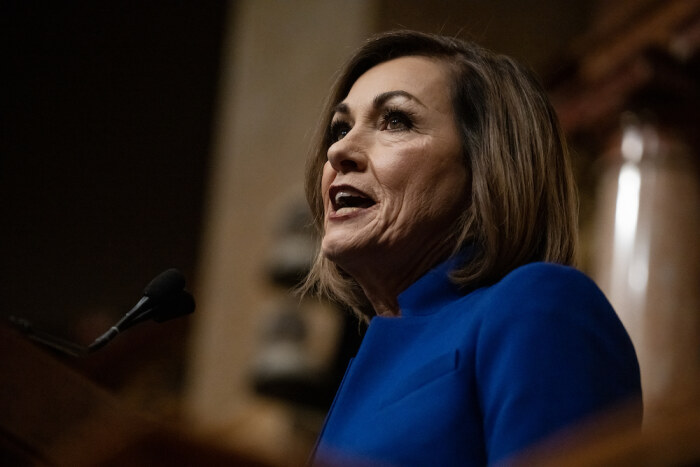Henry Jay Karp is the Rabbi Emeritus of Temple Emanuel in Davenport, Iowa, which he served from 1985 to 2017. He is the co-founder and co-convener of One Human Family QCA, a social justice organization.
I am writing this from a hotel room in Scottsdale, Arizona where I am isolating after coming down with COVID-19.
Once again, Governor “COVID Kim” Reynolds has shown us her true colors. She is governor to the rich, enabling the rich to get richer, while she works to widen the class divide in the state. She is seeking to secure a defined underclass, by undermining the public school system; a system created to provide equal educational opportunities to all and a pathway to self-advancement for every Iowan.
If she is successful, we can see similar private school voucher programs popping up in many other red states.
Here are a few questions I have about her proposals:
1. Will these vouchers cover the full cost of admission to the private school? If not, then they are a sham, giving financial aid to those who already can afford to attend those schools while making such a transition to private education unachievable to the poor.
In so doing, this program would cream a segment of the middle class from the public schools, shifting them into private schools while redefining the public school system as the schools for the poor. This plan is just a variation on a theme, that theme being a reversal of Brown vs. the Board of Education, creating a new way to impose a form of segregation in our school system.
This should come as no surprise, for during the worst days of the pandemic, Reynolds was quick to throw the immigrant community under the bus by requiring them to go back to work in the crowded meatpacking plants and then not including their COVID-19 case numbers in the state’s tallies. She has been, and continues to be, the governor for white Iowans, and the rest be damned.
2. If the private schools receive these state funds, indirectly through their students, will they retain the right to determine who they will admit to their schools or will they be required to admit all applicants?
If their right to exclusivity is preserved, this is just another means of providing state-sponsored discrimination. This would be just another end run around Brown vs. the Board of Education.
3. Will these private schools be required to provide services to students with disabilities, both physical and mental disabilities?
If not, then while these private schools will only be drawing from the enabled students of our public schools, then public school systems will become the sole provider of services for students with disabilities, along with the significant expenses those services require. In addition, the state will be investing so much into the voucher program that it may not be able to adequately fund serves for students with disabilities. Once again, this would be a state-sanctioned form of discrimination.
4. Would this program attract enough students from rural school districts to the point where they are no longer viable?
As an agricultural state, Iowa has depended heavily on rural schools. In small communities, schools often struggle to get by with sometimes very limited school populations.
On the other hand, would the students in the rural districts be carved out of this program for lack of nearby private schools to attend?
Either way, school vouchers do not bode well for the rural school districts.
5. Governor Reynolds is looking to sugar-coat this proposal by offering to increase funding to public schools by 2.5 percent. Is she for real?
Iowa schools used to be ranked as some of the best in the nation, but as the Republicans took control of the state legislature and the governor’s chair, our schools were repeatedly underfunded. It will take far more than a 2.5 percent increase in state funding to return them to their former stature.
In the past, the governor’s school voucher proposals have failed due to bipartisan opposition. However, in last year’s Republican primaries, Reynolds actively campaigned against legislators in her own party that opposed her on this issue. Several were defeated by candidates who supported her proposal.
Compounding that, the last election gave Republicans a massive majority in both chambers of the legislature. It seems almost inevitable that this time, the governor will have her way. If so, democracy will have received another body-blow in Iowa, one that could metastasize to other states with Republican-controlled legislatures.
Top photo: Governor Kim Reynolds delivers the Condition of the State address on January 10. Photo by Kelsey Kremer/Des Moines Register (pool).


1 Comment
Spot on!
You said “If so, democracy will have received another body-blow in Iowa, one that could metastasize to other states with Republican-controlled legislatures.” Very true. And all of Iowa’s rural school districts will suffer from that same body-blow. And in our rural communities that are still fortunate to have an active school system, there goes one of your remaining economic engines that keeps your community afloat. Iowa is already experiencing a severe teacher shortage, largely because of the GOP’s war on public education, teachers, local school boards, etc. through a false culture war. When that same school starts losing already short funding to private schools, guess what that does to the local community’s economic vitality.
bikerboy2006 Mon 16 Jan 10:33 AM